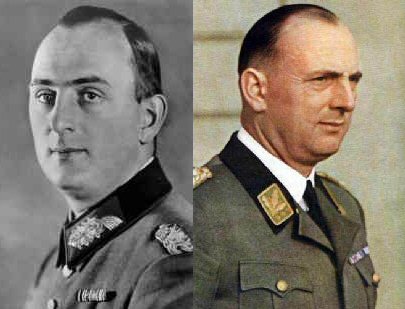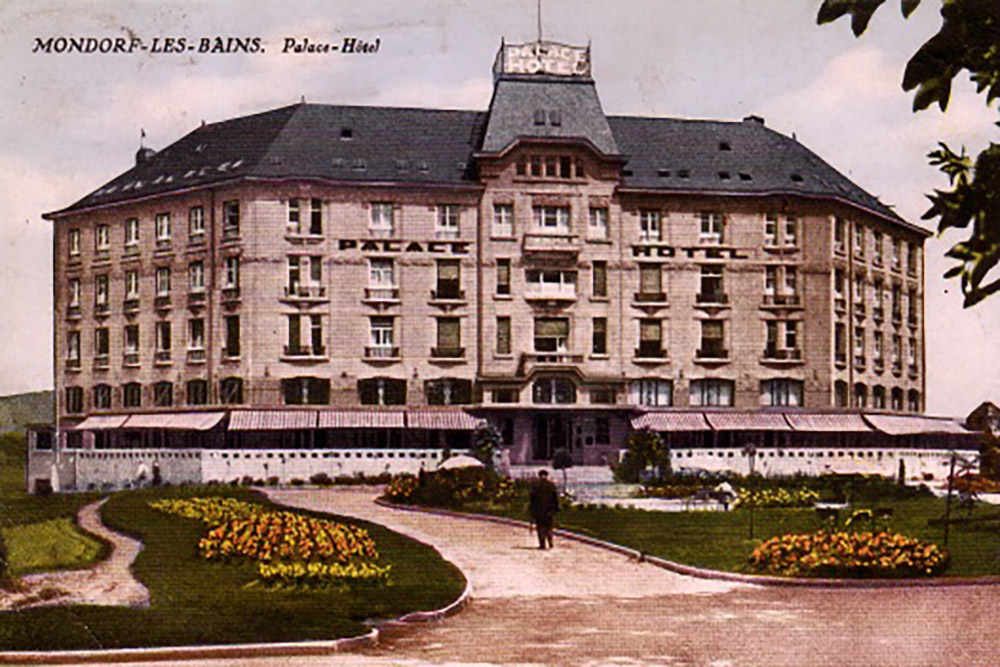Daluege, Kurt Max Franz
- Date of birth:
- September 15th, 1897 (Kreuzburg, Oppeln, Upper-Silesia, Germany)
- Date of death:
- October 24th, 1946 (Pankrác Prison, Prague, Czechoslovakia)
- Service number:
- NSDAP Nr.: 31.981 /// SS-Nr.:1.119
- Nationality:
- German
Biography
Kurt Daluege was born September 1897 in Kreuzberg to a Prussian statesman. In 1916 he joined the German Army with the rank of Lieutenant. In the course of World War One he was wounded several times and was honorably discharged in 1918 as Vizefeldwebel and Offiziersanwärter (Cadet).
Between 1918 and 1921 he participated in struggles between German and Polish militias as Führer of the "Selbstschutzes Oberschlesien" (Selfdefence Upper Silezia) and worked in Berlin as a factory hand. In 1921, while studying Construction Engineering at the University of Berlin until 1924, he became activily engaged in the Freikorps Rossbach.
In 1922 he registered as a member of the NSDAP (National Socialist German Workers Party) and was involved in the Hitler Putsch of November 9th, 1923 as liaison man in Berlin. After the NSDAP was banned, he was involved in keeping together the Partycadre in Berlin and in 1924 he established the "Frontbann" - an element within the SA – remaining its Führer until 1926.
March 1926 he rejoined the re-established NSDAP as member number 31.981 and founded the SA branch for Berlin and northern Germany. Between 1926 Daluege was SA-Gruppenführer in Berlin-Brandenburg and SA-Gausturmführer Gau Berlin-Brandenburg. Between 1926 and 1928 he also acted as deputy Gauleiter for the NSDAP Berlin-Brandenburg. October 16th, 1926 he married Käthe Schwarz; they adopted a daughter and later on they had two more children. Between 1927 and 1933 Daluege was department head of a construction firm and engineer of the waste disposal in Berlin.
In 1930, at Hitler’s request he left the SA and became a member of the SS (SS Nr.: 1.119). As SS-Oberführer Ost he was in charge of the SS Abschnitt III Ost in Berlin. In this capacity he dealt violently with the SA in the so-called Stennes Revolt of 1933, earning Hitler’s permanent protection.
Kurt Daluege also went into politics and became a delegate for the NSDAP in the Prussian Parliament. 1933 he was elected to the Reichstag as delegate for the district Berlin-Ost. Formally he was to remain in this post until 1945. After the take over of power by Hitler, Daluege was named Kommissar z.b.V.(Commissioner for special duties) and Leiter Sonderabteilung Daluege (head of special department) in the Prussian Department of the Interior. In this capacity he cleansed the Prussian police force of so-called Socialdemocratic elements and brought it into line with the Nationaalsocialistic state of mind. To this end he was named Ministerialdirektor and Leiter der Polizeiabteiluing(Chief of Police) in May 1933. As of July 1934, following the Röhm Putsch, Daluege was assigned by Göring to effectively reorganize and cleanse the SA Berlin-Brandenburg, Pommerania, Grenzmark, Silezia and Mitte. August 1934 Himmler rewarded him by promoting him to SS-Obergruppenführer. From July 1934 to June 1936 onwards, Daluege acted as Chief of Police in the Prussian Department of the Interior. Notwithstanding a first heart attack in 1936 he became Himmler’s deputy as Chief of the German Police and Chef der Deutschen Ordnungspolizei in 1936, which made him the highest ranking police officer in the German Reich.
During the war, due to his realtionship with Hitler, Daluege was responsible for the protection of Hitler and other high ranking Party officials.
After Heydrich’s death, Daluege acted as Governor for the Protectorates of Bohemia and Moldavia from 1942 to 1943 from which post he was dismissed after a massive heart attack. In this capacity he was responsible for the reprisals in Lidice following the death of Heydrich and for the oppression and persecution of resistance fighters.
May 1945 he was arrested in Lübeck by British Military Police and imprisonned in Nuremberg. 1946, Daluege was extradicted to Tsjechoslovakia where he was charged with and convicted for warcrimes, including the mass killings in Lidice. October 24th, 1946 he was hanged in Pankrác prison in Prague.
Promotions:
25.10.1917: Vizefeldwebel und Offizier-Anwärter
01.11.1926-01.11.1930: Stellvertretender Gauleiter der NSDAP
25.07.1930: ϞϞ-Mann
July 25th, 1930 to SS-Oberführer;
July 1st, 1932 to SS-Gruppenführer;
September 9th,1934 to SS-Obergruppenführer;
April 20th, 1935 to Generalleutnant der Landespolizei;
June 17th, 1936 to General der Polizei;
April 20th, 1942 to SS-Oberstgruppenführer / Generaloberst der Polizei.
Do you have more information about this person? Inform us!
- Period:
- First World War (1914-1918)
- Awarded on:
- 1918
- Period:
- First World War (1914-1918)
- Awarded on:
- 1918
- Period:
- Second World War (1939-1945)
- Period:
- First World War (1914-1918)
- Awarded on:
- 1929
- Period:
- Second World War (1939-1945)
- Awarded on:
- 1931
- Period:
- Second World War (1939-1945)
- Awarded on:
- 1932
- Period:
- Second World War (1939-1945)
- Awarded on:
- February 1st, 1934
- Period:
- Second World War (1939-1945)
- Awarded on:
- 1934
- Period:
- Second World War (1939-1945)
- Period:
- Second World War (1939-1945)
- Awarded on:
- October 29th, 1936
- Period:
- Second World War (1939-1945)
- Awarded on:
- April 20th, 1937
- Awarded on:
- October 19th, 1937
- Period:
- Second World War (1939-1945)
- Awarded on:
- October 18th, 1938
- Period:
- Second World War (1939-1945)
- Awarded on:
- October 26th, 1939
- Period:
- Second World War (1939-1945)
- Awarded on:
- November 21st, 1939
- Period:
- Second World War (1939-1945)
- Awarded on:
- January 30th, 1940
- Period:
- Second World War (1939-1945)
- Awarded on:
- January 30th, 1941
- Period:
- Second World War (1939-1945)
- Awarded on:
- April 20th, 1941
- Period:
- Second World War (1939-1945)
- Awarded on:
- 1941
- Period:
- Second World War (1939-1945)
- Awarded on:
- June 22nd, 1942
- Period:
- Second World War (1939-1945)
- Rank:
- ϞϞ-Oberst-Gruppenführer und Generaloberst der Polizei and Chef der Ordnungspolizei
- Awarded on:
- September 10th, 1942
- Period:
- Second World War (1939-1945)
- Awarded on:
- July 28th, 1943
- Period:
- Second World War (1939-1945)
- Rank:
- SS-Obergruppenführer / General der Waffen-SS und Polizei (Lieutenant-General)
- Unit:
- Reichsprotektor, Böhmen und Mähren
- Awarded on:
- September 7th, 1943
As a result of these efforts I consider him worthy of decoration with the Ritterkreuz des Kriegsverdienstkreuzes and request this award for him.
- Period:
- Second World War (1939-1945)
Sources
- Photo 1: Wilco Vermeer/Willi Schumacher
- - Patzwall K., Scherzer V., Das Deutsche Kreuz 1941-1945, Geschichte und Inhaber Band I, Verlag Klaus D. Patzwall, Norderstedt, 2007, ISBN 3-91533-46-8
- Axis Biographical Research
- Biographical Dictionary
- SHOAH Resource Centre





































